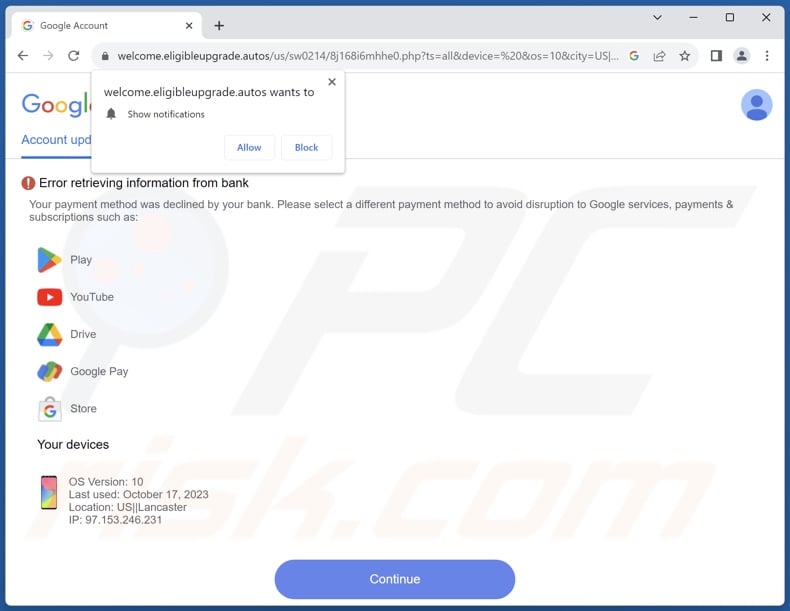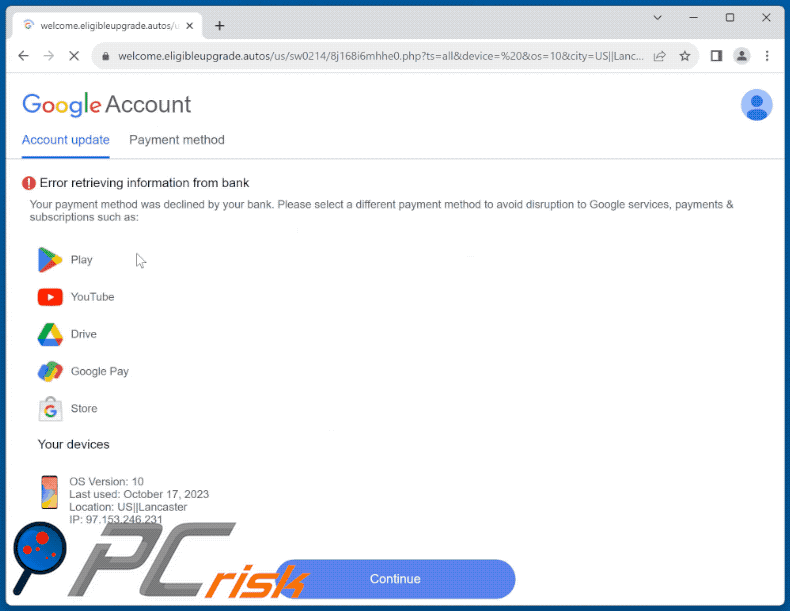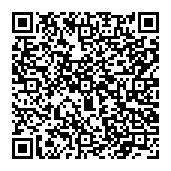Avoid getting scammed by "Error Retrieving Information From Bank" websites
![]() Written by Tomas Meskauskas on (updated)
Written by Tomas Meskauskas on (updated)
What kind of scam is "Error Retrieving Information From Bank"?
While investigating suspect websites, our research team discovered the "Error Retrieving Information From Bank" scam. It falsely claims that there is an issue with the user's preferred payment method. Despite how the scam is presented, it is in no way associated with Google LLC or any of its services and platforms.

"Error Retrieving Information From Bank" scam overview
When we accessed a site running this scam, it presented us with an error. The alert stated that the user's payment method was declined by their bank. They were requested to select a different one to prevent any interruptions to Google services, payments, and subscriptions listed below on the webpage.
After we clicked the "Continue" button, the scam displayed another page. It urged to update the payment method and reassured the user that this information is only visible to Google.
It must be stressed that all the claims made by this scam are fake, and this content is not associated with any of the Google services/platforms.
After we selected the only available payment method – "Add credit or debit card", the website force-opened another page that failed to load. It is highly likely that this scam was intended to open a phishing site targeting credit/debit card details.
Note that this could be rectified, and "Error Retrieving Information From Bank" might redirect to a functional webpage. Phishing sites record and send the provided information to scammers. Cyber criminals can then use the exposed finance-related data to make fraudulent transactions and/or online purchases.
It is pertinent to mention that as the nonfunctional page was force-opened, the site running the scam simultaneously redirected to a different webpage. This is likely due to the initial website being monetized through rogue advertising networks.
These networks typically promote untrustworthy, deceptive, harmful, and even malicious sites. However, they may lead users to legitimate ones as well. Scammers commonly abuse the affiliate programs of genuine content to obtain illegitimate commissions for the promotion (i.e., redirects).
Another thing of note regarding the scam-running page is that it requested permission to display browser notifications. Rogue websites use them to run intrusive ad campaigns. The delivered advertisements primarily endorse online scams, unreliable/hazardous software, and potential malware.
To summarize, by trusting a scam like "Error Retrieving Information From Bank" – users can experience system infections, serious privacy issues, financial losses, and identity theft.
If your private data has been compromised (e.g., credit/debit card numbers, ID card details, passport photos/scans, etc.) – contact the appropriate authorities without delay.
| Name | "Error Retrieving Information From Bank" scam website |
| Threat Type | Phishing, Scam, Social Engineering, Fraud |
| Fake Claim | The bank declined the user's chosen payment method, and they are requested to select a different one. |
| Disguise | |
| Related Domains | eligibleupgrade[.]autos |
| Detection Names (eligibleupgrade[.]autos) | N/A (VirusTotal) |
| Serving IP Address (eligibleupgrade[.]autos) | 156.38.249.83 |
| Distribution methods | Compromised websites, rogue online pop-up ads, potentially unwanted applications. |
| Damage | Loss of sensitive private information, monetary loss, identity theft, possible malware infections. |
| Malware Removal (Windows) | To eliminate possible malware infections, scan your computer with legitimate antivirus software. Our security researchers recommend using Combo Cleaner. |
Online scams in general
The Internet is rife with deceptive and malicious content. Various false claims are used to gain and subsequently abuse victims' trust. While the immediate aims may vary, the end goal is almost always financial gain.
We have examined thousands of online scams. Some common models include: prizes and lotteries (e.g., "Win Mac Book M2", "Apple iPhone 14 Winner", etc.), cryptocurrency giveaways (e.g., "Brad Garlinghouse Crypto Giveaway", "Apple Crypto Giveaway", etc.), tech support (e.g., "Critical Error IP Threat Detected", "Your Google Account Has Been Locked!", etc.), and threat alerts (e.g., "Security Protection Center", "Avast - Your PC Is Infected With 5 Viruses!", etc.).
How did I open a scam website?
Scam pages can be force-opened by sites using rogue advertising networks. The latter can likewise generate redirects to the former when hosted content is interacted with (e.g., clicking buttons, text input fields, links, ads, etc.). Intrusive advertisements and spam browser notifications endorse online scams as well.
Mistyping a website's URL can also result in a redirect (or a redirection chain leading) to a deceptive webpage. Additionally, spam (e.g., emails, PMs/DMs, SMSes, forum posts, etc.) can be used to promote this content. Another promoter is adware; it can display adverts endorsing scams or force-open sites running them.
How to avoid visiting scam websites?
It is essential to be careful while browsing since fraudulent and malicious online content usually appears legitimate and innocuous. For example, intrusive ads and spam browser notifications may look harmless – yet redirect to unreliable and questionable websites (e.g., scam-promoting, gambling, pornography, adult dating, etc.).
To avoid receiving unwanted browser notifications – do not permit suspect sites to deliver them (i.e., do not click "Allow", "Allow Notifications", etc.). Instead, ignore or deny notification requests from such pages (i.e., select "Block", "Block Notifications", etc.). Additionally, pay attention to URLs and enter them with care.
Incoming emails and other messages have to be treated with caution; attachments and links present in dubious mail must not be opened since they can be malicious.
Another recommendation is to download only from official/verified channels and be vigilant with installations (e.g., read terms, study possible options, use the "Custom/Advanced" settings, opt out of additions, etc.). If your computer is already infected, we recommend running a scan with Combo Cleaner Antivirus for Windows to automatically eliminate all threats.
Text presented in the "Error Retrieving Information From Bank" scam:
Google Account
Account update Payment method
! Error retrieving information from bank
Your payment method was declined by your bank. Please select a different payment method to avoid disruption to Google services, payments & subscriptions such as:
Play
YouTube
Drive
Google Pay
Store
Your devices
-
Continue
The appearance of "Error Retrieving Information From Bank" pop-up scam (GIF):

Instant automatic malware removal:
Manual threat removal might be a lengthy and complicated process that requires advanced IT skills. Combo Cleaner is a professional automatic malware removal tool that is recommended to get rid of malware. Download it by clicking the button below:
▼ DOWNLOAD Combo Cleaner
By downloading any software listed on this website you agree to our Privacy Policy and Terms of Use. To use full-featured product, you have to purchase a license for Combo Cleaner. 7 days free trial available. Combo Cleaner is owned and operated by Rcs Lt, the parent company of PCRisk.com read more.
Quick menu:
- What is "Error Retrieving Information From Bank" scam website?
- How to identify a pop-up scam?
- How do pop-up scams work?
- How to remove fake pop-ups?
- How to prevent fake pop-ups?
- What to do if you fell for a pop-up scam?
How to identify a pop-up scam?
Pop-up windows with various fake messages are a common type of lures cybercriminals use. They collect sensitive personal data, trick Internet users into calling fake tech support numbers, subscribe to useless online services, invest in shady cryptocurrency schemes, etc.
While in the majority of cases these pop-ups don't infect users' devices with malware, they can cause direct monetary loss or could result in identity theft.
Cybercriminals strive to create their rogue pop-up windows to look trustworthy, however, scams typically have the following characteristics:
- Spelling mistakes and non-professional images - Closely inspect the information displayed in a pop-up. Spelling mistakes and unprofessional images could be a sign of a scam.
- Sense of urgency - Countdown timer with a couple of minutes on it, asking you to enter your personal information or subscribe to some online service.
- Statements that you won something - If you haven't participated in a lottery, online competition, etc., and you see a pop-up window stating that you won.
- Computer or mobile device scan - A pop-up window that scans your device and informs of detected issues - is undoubtedly a scam; webpages cannot perform such actions.
- Exclusivity - Pop-up windows stating that only you are given secret access to a financial scheme that can quickly make you rich.
Example of a pop-up scam:

How do pop-up scams work?
Cybercriminals and deceptive marketers usually use various advertising networks, search engine poisoning techniques, and shady websites to generate traffic to their pop-ups. Users land on their online lures after clicking on fake download buttons, using a torrent website, or simply clicking on an Internet search engine result.
Based on users' location and device information, they are presented with a scam pop-up. Lures presented in such pop-ups range from get-rich-quick schemes to fake virus scans.
How to remove fake pop-ups?
In most cases, pop-up scams do not infect users' devices with malware. If you encountered a scam pop-up, simply closing it should be enough. In some cases scam, pop-ups may be hard to close; in such cases - close your Internet browser and restart it.
In extremely rare cases, you might need to reset your Internet browser. For this, use our instructions explaining how to reset Internet browser settings.
How to prevent fake pop-ups?
To prevent seeing pop-up scams, you should visit only reputable websites. Torrent, Crack, free online movie streaming, YouTube video download, and other websites of similar reputation commonly redirect Internet users to pop-up scams.
To minimize the risk of encountering pop-up scams, you should keep your Internet browsers up-to-date and use reputable anti-malware application. For this purpose, we recommend Combo Cleaner Antivirus for Windows.
What to do if you fell for a pop-up scam?
This depends on the type of scam that you fell for. Most commonly, pop-up scams try to trick users into sending money, giving away personal information, or giving access to one's device.
- If you sent money to scammers: You should contact your financial institution and explain that you were scammed. If informed promptly, there's a chance to get your money back.
- If you gave away your personal information: You should change your passwords and enable two-factor authentication in all online services that you use. Visit Federal Trade Commission to report identity theft and get personalized recovery steps.
- If you let scammers connect to your device: You should scan your computer with reputable anti-malware (we recommend Combo Cleaner Antivirus for Windows) - cyber criminals could have planted trojans, keyloggers, and other malware, don't use your computer until removing possible threats.
- Help other Internet users: report Internet scams to Federal Trade Commission.
Frequently Asked Questions (FAQ)
What is a pop-up scam?
Pop-up scams are designed to trick users into performing specific actions. For example, victims can be deceived into making monetary transactions, disclosing private data, purchasing products, subscribing to services, downloading/installing software, etc.
What is the purpose of a pop-up scam?
Pop-up scams aim to generate revenue. Cyber criminals primarily profit by obtaining funds through deception, abusing or selling private information, promoting content, and proliferating malware.
I have provided my personal information when tricked by a scam, what should I do?
If you have provided your log-in credentials – immediately change the passwords of all possibly exposed accounts and inform their official support. If you've disclosed other private information (e.g., ID card details, passport photos/scans, credit card numbers, etc.) – contact the corresponding authorities without delay.
Why do I encounter fake pop-ups?
Pop-up scams are promoted on rogue webpages. Most visitors access such pages via redirects caused by websites using rogue advertising networks, misspelled URLs, intrusive ads, spam browser notifications, or installed adware.
Will Combo Cleaner protect me from pop-up scams?
Combo Cleaner can scan visited websites and detect rogue, deceptive, and malicious ones. Should you access such a page – you will be warned immediately, and further access to it will be blocked.


▼ Show Discussion